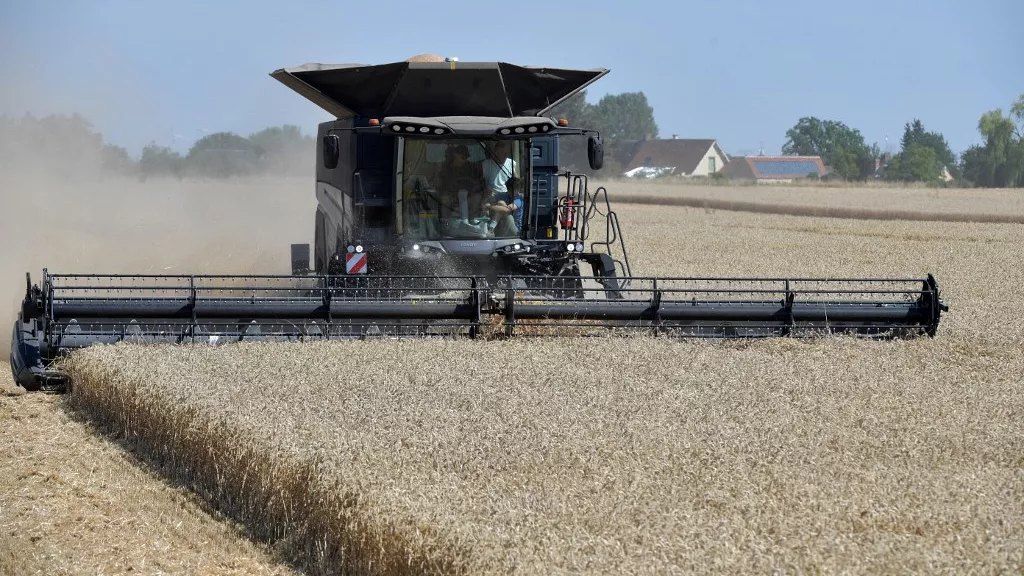
JEAN-FRANCOIS MONIER/AFP or licensors
By Rédaction Africanews with AFP
Will France still be able to export cereals to Africa on April 25? The government wants to be reassuring, while producers and traders fear that they will no longer be able to use an insecticide (phosphine) in direct contact with the grains, which would close the door to their historical customers.
“There is nothing to worry about for our exports,” French Foreign Trade Minister Olivier Becht said on Tuesday, while his Agriculture counterpart, Marc Fesneau, underlined the major role that France would continue. to stand for global “food security”.
The government was questioned by several deputies on the consequences of a decision by the French Health Security Agency (Anses), dating from October 2022, which does not authorize, from April 25, the use of PH3 insecticide (or phosphine ) in the fumigation of the holds of ships only on condition that it is not “in direct contact with cereals”.
“If no decision is taken, on April 25, we will no longer be able to export to countries such as Togo, Cameroon, Algeria, or Egypt, which require in their specifications fumigation in direct contact with grains,” Eric Thirouin, president of the Association of French Grain Producers (AGPB), told AFP.
Food Safety
“We are up against the wall. Belgium, Germany, and all the other European countries have reauthorized the use of direct fumigation, except France. This means that the 4th largest wheat exporter in the world may no longer be able to deliver to its customers. , which would have a serious impact on food security, and on the trade balance of France” where cereals weighed “11.5 billion euros” in 2022, he underlined.
Well aware of the issues, the government explained that it was seeking a “legal” solution to circumvent this constraint. “France will continue to export cereals. It does so within the framework of European law which allows derogation from the ban (…) at the request of importing countries”, indicated Marc Fesneau.
“There are still legal clarifications to be made, but I can guarantee you that by April 25, decisions will be made so that exports can continue,” said Olivier Becht.
Fumigation
Until now, insecticide tablets have been placed directly on grain shipments. Although it is technically possible to perform the fumigation indirectly by placing the tablets in a box or pierced pocket, this process is refused by certain third countries, which consider that they do not have the capacity to reprocess packaging considered to be toxic waste.
For Synacomex, the exporters’ union, it was ANSES’s decision that caused this deadlock, because the agency “restricted” the marketing authorization (MA) requested by the Dutch company UPL Holdings Coöperatief UA which markets PH3.
Contacted by AFP, ANSES said it had only responded to the file sent by the company UPL.
“We have not banned phosphine (a gas that can be dangerous for humans in the event of inhalation of massive doses, editor’s note). We have deemed the files submitted by UPL to be compliant. But all the tests on the residues ( of insecticide) sent by the applicant related to a protocol where the product is never put directly into the grain. We have therefore only validated these protocols, “ said Charlotte Grastilleur, deputy general manager of the pole, to AFP. ANSES-regulated products.
European law
“On February 21, the company UPL even explained to us that it was not claiming the use at the heart of the grain (direct fumigation, editor’s note) because its results of analyzes concerning (pesticide) residues would be non-compliant. European regulations,” she added.
ANSES explains that it can only review its decision in the event of “new scientific fact”, which is not the case here.
In this situation, estimates ANSES, one of the avenues would be to rely on European law which authorizes exceeding maximum residue limits in certain cases for export, independently of the MAs issued at the national level.

